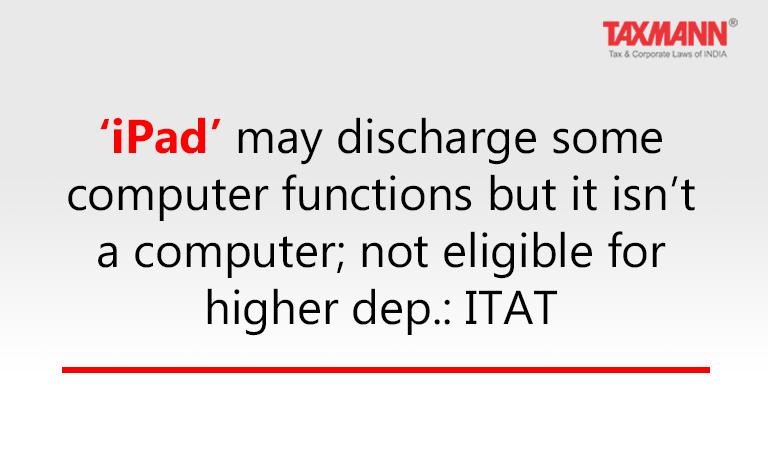‘iPad’ may discharge some computer functions but it isn’t a computer; not eligible for higher dep.: ITAT
- Blog|News|Income Tax|
- 2 Min Read
- By Taxmann
- |
- Last Updated on 9 September, 2021

Case details: Kohinoor Indian (P.) Ltd. v. ACIT - [2021] 129 taxmann.com 396 (Amritsar - Trib.)
Judiciary and Counsel Details
-
- Laliet Kumar, Judicial Member and Dr. M.L. Meena, Accountant Member.
- Sandeep Vijh, CA for the Appellant.
- Smt. Ratinder Kaur, DR. for the Respondent.
Facts of the Case
Assessee purchased an apple iPad during the year and claimed depreciation at the rate of 60%. Assessing Officer (AO) held that Apple had two other variants; iPhone and Mac Book. A comparison of the technical specification would reveal that the iPad has more similarities with iPhone. Both of them share the same operating system. Both the iPad and iPhone contain an inbuilt 2G/3G/4G connectivity and GPS, primarily an inherent mobile phone feature, whereas Mac Book does not contain the same.
Further, the sim card and mobile network come under the iPad & iPhone and not Mac Book. Based on this comparison, AO concluded that the iPad had more similarities with iPhone and thus was a phone and not a computer. CIT(A) upheld the order passed by AO.
Assessee contended that the iPad, which has all the computer features and performs the functions of a computer, to be treated as a computer. Even otherwise, the size of the iPad is 9.7 inches with a weight of over 600gms. It is not practical to use it as a phone. It is pertinent to mention that the assessee’s iPad can make no cellular calls as per the specifications. Further, making a cellular call cannot be the determinative factor as to whether a device is to be treated as a computer or as a phone. Phone calls can also be made using Skype or other such applications, even from desktop computers. As long as a device performs functions as described under the Information technology Act, 2000 or those that define a computer in common parlance, the device is to be treated as a computer.
ITAT held
On further appeal, Amritsar ITAT held that the predominant purpose of the iPad is communication and not a computing device. Its main features are email, WhatsApp, facetime calls, calls, music, films, etc. Though the iPad may discharge some of the functions of computers, it is not a substitution for computers or laptops. In common parlance, the iPad is considered as communicating device with some additional features of a computer.
Further, apple stores do not sell the iPad as a computer device; rather, it is selling it as communicating/entertainment device. Another reason based on which the iPad can be held as a communication device is it has an IMEI number. Though assessee had denied having an IMEI number, no concrete records have been produced on record in this regard. Accordingly, ITAT held that the iPad is not a computer; hence depreciation is applicable at a lower rate.
Disclaimer: The content/information published on the website is only for general information of the user and shall not be construed as legal advice. While the Taxmann has exercised reasonable efforts to ensure the veracity of information/content published, Taxmann shall be under no liability in any manner whatsoever for incorrect information, if any.

Taxmann Publications has a dedicated in-house Research & Editorial Team. This team consists of a team of Chartered Accountants, Company Secretaries, and Lawyers. This team works under the guidance and supervision of editor-in-chief Mr Rakesh Bhargava.
The Research and Editorial Team is responsible for developing reliable and accurate content for the readers. The team follows the six-sigma approach to achieve the benchmark of zero error in its publications and research platforms. The team ensures that the following publication guidelines are thoroughly followed while developing the content:
- The statutory material is obtained only from the authorized and reliable sources
- All the latest developments in the judicial and legislative fields are covered
- Prepare the analytical write-ups on current, controversial, and important issues to help the readers to understand the concept and its implications
- Every content published by Taxmann is complete, accurate and lucid
- All evidence-based statements are supported with proper reference to Section, Circular No., Notification No. or citations
- The golden rules of grammar, style and consistency are thoroughly followed
- Font and size that’s easy to read and remain consistent across all imprint and digital publications are applied



 CA | CS | CMA
CA | CS | CMA
